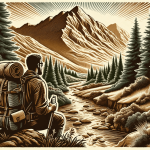Prepper vs Survivalist
Have you ever wondered about the differences between preppers and survivalists? In today’s uncertain world, many people are taking steps to prepare for emergencies and unexpected events. However, it’s essential to understand the distinct methods and mindsets of preppers and survivalists to know which approach is the best fit for your personal needs and values.
Preppers focus on stockpiling supplies, creating a well-equipped homestead, and developing a plan for various disaster scenarios, while survivalists rely on their skills, knowledge, and ability to adapt to whatever situation they may face. Both groups share a common goal – to survive and thrive in the face of adversity – but their individual strategies and overall philosophies can differ significantly.
Key Takeaways
- Preppers emphasize planning, stockpiling, and creating a self-sufficient homestead
- Survivalists rely on their skills and natural abilities to adapt and navigate challenging situations
- Both approaches share the goal of resilience in the face of adversity, but differ in methods and philosophies
Understanding the Terminology
I have come across many people who use the terms “prepper” and “survivalist” interchangeably, but there are crucial differences between the two. I want to clarify these differences so that readers can better understand the distinctions and determine which lifestyle they might lean toward.
Preppers generally focus on preparations for possible catastrophes or emergencies, such as stocking up on essential supplies like food, water, and medical supplies. These individuals believe in being self-sufficient during crises and that preparing for disasters is a responsible action. They often invest in supplies that will last for months or even years and establish a well-rounded stockpile for various scenarios (source).
On the other hand, survivalists place more emphasis on their ability to adapt and survive in any situation using the resources available in their surroundings. They acquire skills like foraging, hunting, and shelter-building to live off the land. Survivalists are not as focused on stockpiling supplies as preppers. Instead, their primary concerns are resourcefulness and adaptability (source).
The main difference between preppers and survivalists lies in their preparation style. Preppers invest in stockpiling essential items to tide them over during emergencies, while survivalists hone their skills to survive independently with minimal resources. Both preppers and survivalists share a common determination to be self-reliant and resilient during crises, but their approaches differ significantly (source).
I hope this section has helped clarify the terminology surrounding preppers and survivalists, as well as highlighted their key differences. By understanding these distinctions, you can better grasp the mindset and methods of each lifestyle.
The Prepper’s Mindset and Goals
As a prepper, my mindset revolves around being prepared for various scenarios that could disrupt my daily life. I focus on accumulating supplies, planning for specific situations, and building a support network to ensure my safety and survival during such events. This approach is centered on long-term preparedness, with the main goal of achieving self-sufficiency and resilience in the face of adversity.
When I first started prepping, one of my primary concerns was setting realistic goals for my preparations. Newbie preppers often find themselves overwhelmed by the vast amount of information and possible scenarios to prepare for. In order to stay focused and efficient, I prioritize my goals as follows:
- Basic needs: Ensuring I have access to essential resources such as clean water, food, and shelter, is the foundation of my preparedness plan. I stock up on non-perishable food items, water purification methods, and basic shelter materials to cover this aspect.
- Safety and security: Protecting myself and my loved ones during an emergency is crucial. To achieve this, I invest in personal security measures like self-defense tools and create contingency plans for evacuations or lockdowns.
- Medical preparedness: Accidents and illnesses can happen unexpectedly; hence, I maintain a well-equipped first aid kit and learn essential medical skills to be prepared for such situations.
- Communication: Staying informed and maintaining contact with my support network is vital during emergencies. I acquire alternative means of communication, such as two-way radios and satellite phones, in case conventional channels fail.
- Financial security: Unexpected crises may affect my financial stability, so I work towards diversifying my income streams, saving, and investing to ensure long-term financial resilience.
My prepping journey is an ongoing process, as new challenges and potential threats may arise over time. By staying vigilant and continuously learning, I adapt my plans and provisions accordingly, so I’m always prepared for any unforeseen circumstances that life may throw my way.
Key Prepper Skills and Resources
Stockpiling Supplies and Equipment
As a prepper, one of my main focuses is on stockpiling supplies and equipment that would be essential during a crisis. This includes acquiring a variety of shelf-stable food, water, and other necessities. Equally important is organizing a storage system, so I can easily access and rotate my supplies to prevent spoilage. Another critical aspect of stockpiling for me is investing in high-quality gear like portable solar panels, water purification devices, and durable clothing.
First Aid and Medical Preparedness
I understand the importance of first aid and medical preparedness. I keep a well-stocked first aid kit with essential supplies like bandages, antiseptic wipes, and over-the-counter medications. I also invest time in learning how to treat common injuries and manage medical emergencies that may arise during a crisis.
Self-Defense and Firearms
Given the uncertain nature of disaster situations, I acknowledge the need for self-defense and firearms skills. This means not only owning the right firearms for my personal situation but also being well-trained in their use and maintenance. I practice regularly to maintain my proficiency and stay current with best practices for firearm safety.
Homesteading and Gardening Skills
In addition to stockpiling resources, another key part of my prepper lifestyle is developing homesteading and gardening skills. Cultivating a garden and raising small livestock helps to ensure a sustainable food supply during long-term emergencies. I continuously seek to learn best practices for growing food, preserving my harvest, and adapting to local conditions.
Financial Preparedness
Lastly, financial preparedness is a vital aspect of my prepping strategy. I focus on having an emergency fund, reducing debt, and maintaining a diversified investment portfolio. This financial stability allows me to weather economic downturns and other events that could disrupt my income or access to resources.
The Survivalist’s Mindset and Goals
As a survivalist, my primary mindset revolves around self-reliance and the ability to adapt to different situations, especially in wilderness survival scenarios. The core principle of survivalism is to be prepared, both mentally and physically, for any challenging situation that might arise.
One of my main goals is to acquire a diverse skill set that enables me to survive in various environments, with minimal resources. I focus on honing my abilities in areas such as bushcraft, navigation, and hunting, to be able to live off the land if necessary.
Another important aspect of the survivalist mindset is the willingness to make do with what’s available. Although having essential gear and supplies is useful, I understand that they may not always be accessible in emergencies. Therefore, I strive to find innovative ways to utilize my surroundings and improvise when needed.
Additionally, survivalists like me prioritize physical fitness. Keeping my body in top condition helps improve my chances of survival when facing harsh conditions or potential threats. I incorporate regular exercise and proper nutrition into my daily routine to maintain my strength, endurance, and overall health.
Finally, I believe that a strong mental fortitude is indispensable for survival. I cultivate a mindset of preparedness, resilience, and determination to persevere through unexpected circumstances. Adopting a positive attitude and effective problem-solving approach can make all the difference during challenging situations.
In summary, the survivalist’s mindset and goals revolve around self-reliance, adaptability, and resourcefulness. As a survivalist, I work towards mastering essential skills, staying physically fit, maintaining mental toughness, and being prepared to face challenges in any environment.
Key Survivalist Skills and Resources
As a survivalist, I focus on developing a well-rounded skill set and acquiring knowledge that allows me to live off the land and adapt to various situations. In this section, I will discuss some of the essential survivalist skills, covering topics such as hunting and trapping, foraging, building shelter, navigating the wilderness, and medical knowledge.
Hunting and Trapping
An essential skill in wilderness survival is the ability to hunt and trap animals for food. I have learned to identify the tracks and signs of various animals and familiarized myself with their behavior patterns. This helps me determine the best time and location for setting traps or waiting with a weapon. I’ve become proficient with different types of traps, such as snares, deadfalls, and box traps, as well as various hunting weapons, including bows, slingshots, and firearms.
Foraging for Food and Water
Apart from hunting, I’m also skilled in foraging for edible plants, fruits, and nuts to supplement my diet. I’ve gained knowledge of numerous plants and their nutritional benefits, while also understanding their potential toxicity. I’ve honed my skills in locating fresh water sources, filtering water obtained from streams and ponds, and testing water for potability.
Building Shelter
Providing myself with a reliable shelter is crucial to my survival. I have learned to construct various types of shelters using materials available in the wilderness. Some examples include:
- Lean-to shelters made from branches and leaves
- Snow shelters such as snow caves and igloos
- Debris huts utilizing sticks, leaves, grass, and other available resources.
I consider factors such as insulation, protection from elements, and stealth when building a shelter, ensuring that it’s both practical and comfortable.
Navigating the Wilderness
To avoid getting lost in the wilderness, I’ve developed navigation skills using natural landmarks, celestial bodies, and even the behavior of animals. I can use techniques such as map and compass navigation, orienteering using the sun or stars, and following water sources to find my way in the wild.
Medical Knowledge
Last but not least, having some medical knowledge is invaluable in any survival situation. I have familiarized myself with basic first aid treatments, administering necessary care for cuts, bruises, fractures, and preventing infection. I’m also knowledgeable about natural remedies found in the wilderness, like using certain plants as pain relievers or antiseptics.
In conclusion, a survivalist like myself thrives by mastering a wide range of skills and acquiring an extensive knowledge base. These abilities allow me to adapt to various situations and become self-reliant in the most challenging environments.
Similarities and Differences Between Preppers and Survivalists
As someone who has researched both preppers and survivalists, I can confidently share the key similarities and differences between these two lifestyles. Both preppers and survivalists are focused on self-reliance and preparedness for a variety of scenarios, including natural disasters, economic collapse, and civil unrest. They also tend to be part of a community of like-minded individuals who support and learn from one another. However, there are some distinct differences between the two that I will explain below.
First, let’s talk about preppers. Preppers prioritize stockpiling supplies – think food, water, medical items, and tools – to sustain themselves and their families during emergency situations. Their goal is to have enough resources to last for an extended period without relying on external help. They also focus on developing essential skills such as gardening, canning, and first aid to supplement their stockpile. One noteworthy flaw, or con, related to the prepper lifestyle is the reliance on stored supplies that could potentially run out, get damaged or stolen in a crisis.
In contrast, survivalists maintain a more adaptive approach to emergency situations. They emphasize gaining and refining essential wilderness and urban survival skills like fire-starting, shelter-building, tracking, and navigation. Instead of stockpiling vast amounts of supplies like preppers do, survivalists aim to live off available resources within their environment, no matter the circumstances. This offers them a certain level of flexibility in facing emergencies. However, one con of this lifestyle is that it can be demanding and time-consuming to master all the necessary skills.
When it comes to specific scenarios, preppers tend to be better prepared for events that can be predicted and have a defined timeline, such as hurricanes, winter storms, or power outages. Survivalists, on the other hand, excel in unpredictable scenarios where their skills enable them to adjust and adapt quickly to changing environments and conditions.
In the end, each lifestyle comes with its own set of pros and cons. While preppers might have the advantage of well-stocked supplies, they could be vulnerable when those reserves run out. Survivalists are well-versed in utilizing resources around them, but the range of skills required to navigate various environments can be intense. No matter which path one chooses, both lifestyles involve dedication and commitment to preparedness and self-reliance.
Choosing the Path That’s Right for You
When deciding whether to follow the prepper or survivalist path, it’s crucial to consider your motivations, objectives, and lifestyle preferences. As someone interested in emergency preparedness, I’ve spent time learning about both methods and have found that some key aspects can influence this decision.
Firstly, preppers are more focused on long-term preparation, while survivalists lean towards a minimalist approach. Preppers typically have a higher focus on stockpiling, accumulating shelf-stable food, and the supplies necessary to survive for an extended period. In contrast, survivalists hone their skills in fire-building, finding clean water sources, food hunting, and growing crops, which allows them to be more adaptive when faced with challenges.
Regarding motivations, preppers are concerned with being ready for various disasters and disruptions, both natural and man-made. Survivalists, on the other hand, prioritize self-sufficiency and overcoming challenges using minimal resources. If you value having an extensive supply of resources along with a greater emphasis on planning, prepping may be right up your alley. Conversely, if your motivation is to live off the grid and rely on your skills to survive, the survivalist approach might be more appealing.
When it comes to lifestyle, preppers often aim for an orderly and organized approach, keeping a well-maintained inventory of supplies and a set plan of action for various scenarios. Survivalists, with their more minimalist approach, focus on acquiring practical skills and outdoor abilities that allow them to adapt to new situations quickly. Consider if you prefer a structured or flexible lifestyle when assessing which path suits your preferences better.
Lastly, it’s essential to consider how easily you can adjust to either method. Prepping requires significant investment in storage space and a comfortable working knowledge of various disaster scenarios. In contrast, survivalism demands dedication to learning and mastering practical skills, as well as the physical fitness necessary to tackle challenges.
By reflecting on your motivations, objectives, lifestyle preferences, and flexibility, you should be better positioned to decide whether the prepper or survivalist path is right for you. Remember, it’s possible to combine elements from both approaches to create a tailored plan that meets your specific needs and goals.
Conclusion
In my experience, both preppers and survivalists share a common goal of self-reliance and preparedness for potential disasters. However, their approaches and focuses can be quite different. While preppers often emphasize stockpiling supplies, planning for specific scenarios, and building a support network, survivalists mainly focus on honing their skills, adaptability, and minimalist living.
From what I’ve learned, community plays a significant role for preppers. They often engage with like-minded individuals, sharing knowledge and resources, and providing mutual help in times of crisis. Survivalists, on the other hand, tend to be more self-sufficient and may not rely as heavily on community support.
Training is important for both groups, but they might prioritize different areas of expertise. Preppers might invest more time in learning how to preserve food, setting up off-grid power systems, and coordinating emergency response plans, whereas survivalists concentrate on wilderness skills, such as foraging, shelter-building, and navigation.
In facing various catastrophic events, like natural disasters, economic collapse, or societal collapse, both preppers and survivalists understand the importance of being prepared. Preppers often have well-defined plans and stockpiled resources for specific situations, while survivalists trust their honed skills and adaptability to navigate any challenge that arises.
To sum up, both prepping and survivalism have their merits, depending on individual priorities and circumstances. Ultimately, the choice between the two approaches will depend on what suits one’s personal beliefs, lifestyle, and preparedness goals.
Frequently Asked Questions
What are the main differences between preppers and survivalists?
The main differences between preppers and survivalists lie in their approach and mindset toward preparedness. While preppers focus on stockpiling essential supplies like food, water, and medical items in preparation for emergencies or disasters, survivalists emphasize honing primitive skills like hunting, fishing, and shelter building that allow them to live off the land.
How do prepper and survivalist approaches to preparedness differ?
Preppers generally take a proactive approach to disaster preparedness, putting together emergency kits, learning first aid, and continuously updating their stockpile. They may even have certifications in emergency preparedness. On the other hand, survivalists rely on their ability to adapt and utilize their surroundings when modern conveniences are unavailable. They’re skilled in navigation without a compass and self-protection without the use of modern weapons.
Which skills are unique to preppers and survivalists?
Preppers typically excel in emergency planning, resource management, and first aid. They know how to ration supplies, purify water, and stockpile shelf-stable food like powdered milk and dehydrated goods (source). Survivalists, conversely, possess a wealth of knowledge in wilderness survival techniques like fire making, wild edibles, navigation, and tracking.
How do prepping and survivalism communities interact?
While both communities share a common goal of self-reliance and preparedness in the face of disaster, their methods and philosophies are distinct. However, there is often a mutual respect and understanding between the two communities, as they recognize the value of both preparation and adaptability. Some individuals may even identify as both a prepper and a survivalist, incorporating elements of both approaches.
What are the core philosophies of preppers and survivalists?
The core philosophy of preppers centers on taking responsibility for their own survival and well-being by planning, preparing, and stockpiling necessary supplies in advance of a disaster. They believe in self-reliance and independence from external aid. On the other hand, survivalists emphasize mental and physical adaptability, their ability to find resources and thrive in any situation, no matter how dire or unexpected.
What gear and supplies are essential for preppers and survivalists?
Preppers typically focus on accumulating essential items like non-perishable food, water purification systems, first aid kits, and emergency communication tools. They also create bug-out bags filled with vital gear, such as multi-tools, flashlights, and clothing suited for various weather conditions.
Survivalists invest in equipment that complements their wilderness skills: hunting and fishing tools, fire-starting implements, and potentially primitive weapons for self-defense. They often carry shelters like tarps or tents, maps and compasses for navigation, and water purification tablets or filters. Both groups prioritize the importance of having a well-stocked and comprehensive first aid kit.








